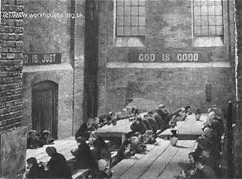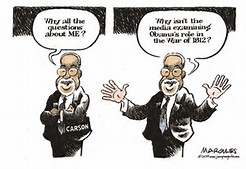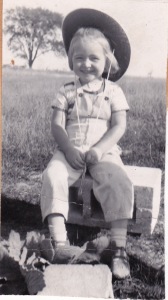There are two types of poor people,
those who are poor together
and those who are poor alone.
The first are the true poor,
the others are rich people out of luck.
Jean-Paul Sartre
My grandparents lived their entire lives in something I like to call genteel poverty. They worked steadily until they retired owing no one but only able to afford modest cruises and a few months during the coldest months at a trailer park in Florida. They lived in a town where the majority of the folks survived just above the poverty line but no one seemed to envy those who had more or mock those who had less. 
They lived through times of fear that the little they’d saved through thrift unimaginable would not nearly be enough to keep debtors from their door and I’m sure at those times family members sacrificed what little they could to help out. But I’m also sure that if they’d had calamitous misfortune – such as a work-related injury for which there was no insurance at that time or a child crippled by birth defect or accident, they could have easily been pulled under.
According to Wikipedia, genteel poverty refers to people once a part of America’s royalty who are now living in squalor with their gems and furs and “dignity.” Most emigrants came to country trying to get away from shit like royalty but apparently after some of them became bloated like ticks with money and power, they decided being a king was a pretty cool thing. And besides, they deserved it. They knew how to bugger the other guy and weren’t too chicken shit to do it.
Picture this scene from Gray Gardens: a middle aged woman and her elderly mother (aunt of Queen Jackie of Camelot) living in a decaying mansion where they eat cat food on china from the Ming Dynasty. 
Do you notice the difference between the two houses? One is modest but well kept and the other looks like a scene from a Hitchcock movie. I don’t agree with Wikipedia. What does eating cat food from Ming era china have to do with refinement?
 This a photo of my grandfather before he shipped out to the Great War. It’s in a cheap plastic frame with a yarn cord for hanging because he was the son of a preacher with five other siblings. Indeed, his name is handwritten on the back so he would not be forgotten in case he did not return. He did; but gaunt and hollow-eyed.
This a photo of my grandfather before he shipped out to the Great War. It’s in a cheap plastic frame with a yarn cord for hanging because he was the son of a preacher with five other siblings. Indeed, his name is handwritten on the back so he would not be forgotten in case he did not return. He did; but gaunt and hollow-eyed.
From American Heritage Dictionary: gen-teel: 1. Refined in manner. 2. Free from vulgarity or rudeness. If taken too far: 3. Marked by affected and somewhat prudish refinement.
I think his picture speaks of gentility. It is refined. It is free from vulgarity or rudeness as was the grandfather I remember, sitting quietly on the screened patio as crickets chirped wildly after an evening thunderstorm, knowing he’d never cheated anyone to get ahead or made an excuse for an unpaid debt.
This is a photo of my grandmother upon her graduation from nursing school.
She was not as refined as her husband. Containing her opinions on any subject involving a hint of impropriety made her face twitch and her eyes flutter like a trapped butterfly. And, if you didn’t really want an honest answer you didn’t ask her.
I know wealthy people who consider themselves genteel and practice noblesse oblige towards those not as fortunate as they are. But they cheat on their taxes and and brag when they’ve managed to game the system. Their children and grandchildren will never go to war or change bedpans of that I’m sure. If I asked them what would happen if they lost everything tomorrow, they would insist that they would still hold onto their dignity and gladly eat cat food off a Ming plate rather than take public assistance of any sort. And I believe them. I just don’t think that qualifies as gentility. How about you?
Of course they honestly believe it could never happen to them because, like many wealthy people, they believe in one or all of the following:
- Life really isn’t so bad for the working poor. People who espouse this opinion generally follow it up with “They could be living back in Dickensian London where debtors were thrown into prison and their children sent to work houses. (This argument is almost as stupid as being told if you don’t eat all your food, people in China will starve.)
- Or they believe the poor are poor because they don’t work hard enough. Gina Rinehart, an Australian mining tycoon and the world’s wealthiest woman: “If you’re jealous of those with more money, don’t just sit there and complain,” she wrote in Australian Resources and Investment magazine. “Spend less time drinking or smoking and socializing, and more time working.”
- Or, that the children of the poor should be put in workhouses as young as possible to contain the virus that causes poverty: “Really poor children in really poor neighborhoods have no habits of working and have nobody around them who works. So they literally have no habit of showing up on Monday. They have no habit of staying all day. They have no habit of ‘I do this and you give me cash’ unless it’s illegal.”– Newt Gingrich, Former House Speaker who said that laws preventing child labor in America were “truly stupid” and that schools should hire working class students to be janitors.
With so many right wing millionaires now in positions of power, I wonder how long it will take them to take a page from the Victorians and pass Poor Laws which force people needing help into prisons called “workhouses.”  Of course they could use the same rationalization as the Victorians did: workhouses will act as a deterrent and fewer people will claim welfare, bringing the poverty rate down to its “correct” level. The Poor Laws were eventually struck down, in a large because authors like Charles Dickens railed against them. However our leaders have already proven they don’t study history.
Of course they could use the same rationalization as the Victorians did: workhouses will act as a deterrent and fewer people will claim welfare, bringing the poverty rate down to its “correct” level. The Poor Laws were eventually struck down, in a large because authors like Charles Dickens railed against them. However our leaders have already proven they don’t study history.
 So how long do you think it will be until the current head of HUD, Ben Carson, comes up with the bright idea to suggest a Poor Law Amendment to the Constitution? Just wondering.
So how long do you think it will be until the current head of HUD, Ben Carson, comes up with the bright idea to suggest a Poor Law Amendment to the Constitution? Just wondering.

As an early childhood professional I hope the powers to be realize the value of our children/future better than the times past. So much more to your post than that but I’ll just begin there. 😊
I hope so too but the people increasingly in charge of this country are so far removed from the lives of the working poor that it’s frightening.
This is something I’d rather not think about, but of course, I have to worry when I do.
This post is well-written and supremely thought-out. Like the previous commenter, I think it stimulates consideration, and I’d like to see more of that. Compassion. Let’s start with compassion.
Thank you Joey! I’m always amazed by those who think poor people are lazy or envious of them. It is possible to live a life you can be proud of and not have a ton of money.
The people I strive to emulate, whom I look up to? — not a one of them is wealthy.
Thought provoking, Jan. Scary thoughts. I agree with joey: compassion, for a start.
You address a very complex subject. here in the UK we have welfare systems originally designed to ensure that no one should live in poverty, though millions still live beneath what is considered the poverty line. We have a segment of the population that are skilled in milking the welfare system and have no wish to work. We have the rich employing lawyers to help them avoid paying their fair share of taxes. We have a Royal family who reward their sycophantic hangers on with rent free grace and favour homes while manipulating the press to portray them as hard working supporters of charity. has anything truly changed since Charles Dickens time? I leave you to answer that.
No sadly people still think that money and power define who you are and without it you’re somehow weak or defective.
We weren’t poor, growing up, but my father worked two jobs most of his working career and continued to work his second job after he retired. My mother went back to work when I (youngest) turned 10 and she worked until she was 75. Until I was 10, we lived in a poor neighborhood, but everyone around us worked. The people who say “the poor don’t want to work” are nuts. The poor, like everyone, would like to be valued for the work they do and they’d like that value to be in the form of a living wage.
I always loved visiting my grandparents and running around the town with children whose parents just barely made ends meet. They really knew how to have fun without spending a lot of money.
We never felt poor, and we always had fun.
So well written Jan. And such poignant pictures.The past was no picnic for most people. And the world’s going through a grim time right now, with the future looking even grimmer. The way I see it, neo-liberalism’s agenda includes the poor getting poorer and the middleclass becoming the new destitute (rather like in the past, only worse), with all of us reduced to economic entities. And, as seems likely soon, when the Koch brothers succeed in ditching Trump and going with Pence (probably their original choice after Cruz) things are only going to get worse. I reckon ‘America first’ and Brexit are fantasies that will make the crash of 2007/8 seem like a walk in the park..
Thank you Colm. I’m afraid you’re probably right.
Well written, thought provoking piece Jan. As an outside observer who cares deeply about what happens in your country because I have so many personal ties such as family, friends, and business contacts there, I have to say that I am deeply concerned for America, and I don’t see many signs for optimism.
The last time the world saw a major society that was this stacked against the poor all for the benefit of the rich, it led to the French revolution and heads literally rolling in the streets. I seriously fear that if the US doesn’t change course soon, it is headed towards this kind of violent class warfare.
I truly hope that I am wrong 😦
Thanks Norm – there’s always hope although sometimes it’s hard to see.
I agree with http://glynhockey.wordpress.com/
Nothing changes, the rich get richer, the poorer get poorer!
Sadly true Willow.
💜
Love your story. Being poor and feeling poor is not the same. I remember my childhood. Never felt poor, but it seems that I had been 🙂 Thank you so much for sharing. I haven’t been around since March, but trying to catch up. xx
Thank you! I’m glad you’re back. You’re absolutely right – being poor and feeling poor are two entirely different things.
Hi Jan,
I got fired from my first ‘real’ job at 11. I lied and said I was 12
At 12 I got a 40 pr week job as a janitor until 13 when I got hired on a Dairy Farm that worked 65 hours during school breaks and 44 during school weeks. I always had money and often more than my dad made.
The problem is that my education and social skills suffered horribly. Even now I struggle to learn ‘social norms’ and what is ‘socially acceptable’. (I’m sure it is obvious to anyone who reads my posts.)
I’m older now and don’t work so much giving me time to look around and examine the ‘other side’ of life.
I have no regret of child labor. I do think 20 hour weeks would have been better long term.
Hopefully our leaders will seek and maybe find a balance.
MN
I also have worked since I was eleven – but not in a poorhouse. Many of those places separated the children from their parents because they could get more work out of them. It is the criminalization of poverty that I’m worried about. Don’t be so hard on yourself – you come across as well-spoken.
You got a fine point. Our family was not destitute and I wasn’t dragged off to the train screaming for my parents.
In fact, at the time I took a lot of pride in my early work experience.
It is truly horrible that in some places now, in the past, and hopefully NOT in the future, that being poor is a crime.
I agree. Being poor is NOT a crime.
Always a pleasure JT